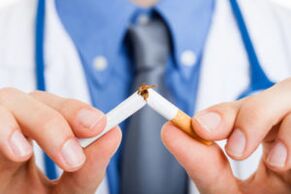
Often, heavy smokers are faced with a deterioration in well-being: they note the appearance of cough with phlegm, shortness of breath, interruptions in the work of the heart. In addition, smoking has a negative effect on the appearance: teeth turn yellow, the complexion becomes dull, and the skin becomes dry. Therefore, almost every smoker has tried to give up the bad habit at least once.
However, instead of feeling better right away, many people find that they literally hurt everything after smoking their last cigarette. As a result, a person returns to smoking, choosing, as it seems to him, the lesser of evils.
Let's see why, with a sharp refusal from cigarettes, certain unpleasant symptoms may appear? What to do if a person quits smoking but has health problems?
Processes in the body after quitting smoking
Each of the smokers who decides to give up cigarettes must understand that his dependence on tobacco is not only psychological, but also physiological in nature. Nicotine in the literal sense of the word is included in the body's metabolism. Therefore, the reason for feeling unwell when quitting smoking is a condition similar to drug withdrawal. The fact that a person, having tied up with an addiction, began to get sick, suggests that the body is rebuilding itself to work without the participation of nicotine.
In addition, it should be understood that these health problems are temporary and will cease to bother once the adaptation period has passed. In other words, someone who is determined to quit smoking should be patient and just get through this time during which he will encounter unpleasant symptoms.
Important!For the sake of fairness, it should be noted that not all yesterday's smokers face pronounced problems. Someone has a very strong withdrawal syndrome, while others simply and easily give up cigarettes.
Gastrointestinal tract
Disruption of the gastrointestinal tract is noted by every second person quitting smoking. Most often, in this case, people notice that they have a stomach ache, since against the background of refusing cigarettes, a decrease in intestinal tone may appear. As a result, increased gas production and constipation begin to worry.
The situation is no less common when a person has quit smoking and is sick. Heartburn often appears after quitting smoking. The reason for such symptoms is the action of tobacco smoke, which, getting into the stomach, irritates its walls and provokes the appearance of gastritis.
However, while a person continues to smoke, nicotine to some extent has an antispasmodic effect and reduces pain. When the intake of an alkaloid into the body stops, gastric juice with an increased level of acidity irritates the mucous membrane, which leads to heartburn, nausea, and pain.
In addition, if a person quit smoking and noticed that his stomach began to ache, the reason for this may be a stomach or duodenal ulcer formed during the addiction. This is a serious illness that requires the supervision of a gastroenterologist. Therefore, if a patient quit smoking and noticed that he had heartburn, nausea and belching, constipation and abdominal pain, he should seek help from a specialist as soon as possible.
Skin problems
Many yesterday's smokers notice pimples on their face and back after quitting smoking. There may be several reasons explaining this phenomenon:
- Changes in vascular tone. During the active effect of nicotine on the body, the smoker's skin becomes dry, and the small vessels that feed it are in a spasmodic state. When quitting smoking, the opposite process can be observed - an increase in the oily skin. The high level of sebum production, in turn, is an excellent background for acne formation;
- If a person quits smoking and has acne, this may indicate a hormonal imbalance, which can also occur in the body against the background of nicotine withdrawal. It should be remembered that quitting smoking is stress for the body, which can affect all its organs and systems;
- Acne after smoking can form due to a banal exacerbation of acne for the same reason: a stressful situation in which the body finds itself during restructuring to a new mode of operation;
- Finally, the appearance of skin problems can be explained by the fact that, quitting a bad habit, a person is so exhausted by the struggle with the desire to smoke that he simply does not have the strength to take care of the skin. As a result, acne on the face is formed due to banal violations of hygiene rules, especially if the skin is initially predisposed to the appearance of such problems.

Throat and oral cavity
Common complaints of those who decide to quit smoking are also sore throats and "scratching" in the throat. As an example, consider a situation: a woman quit smoking and notes that her throat has started to hurt. If before that she could drown out such symptoms with a cigarette, then with a high degree of probability the smoker will return to cigarettes. Meanwhile, it should be understood that a sore throat is also a temporary phenomenon, which is caused by the process of cleansing the airways or exacerbation of a chronic infection against the background of refusal of nicotine.
Another problem of yesterday's smokers is bleeding gums. Sometimes the process is so pronounced that after refusing a cigarette, a person's teeth hurt and become less durable.
The main reason why a person who decides to quit smoking has bleeding gums, stomatitis or loose teeth is a decrease in immunity against the background of refusing nicotine. It becomes difficult for a weakened body to resist gingivitis and tooth decay, which have formed during the time of addiction to tobacco.
Joint and back pain, varicose veins
Often, yesterday's smokers have a feeling of stiffness in the back and joint pain. It would seem that there can be no connection between quitting tobacco and the fact that, for example, a backache. However, the appearance of such symptoms can have several explanations at once.
If a person quit smoking and his legs hurt, this may indicate a manifestation of the so-called drug withdrawal. It is no secret that nicotine has the effect of a weak drug, therefore, when it stops entering the body, it is quite possible that phantom pains appear throughout the body.
Attention!Another explanation for the fact that a smoker has joint pain after he quit a bad habit is the exacerbation of chronic diseases (arthritis, arthrosis) in a stressful situation for the body. In this regard, if the legs hurt after smoking strongly and the joint pain does not go away within a few days, you should seek help from a doctor.
Other side effects after quitting smoking
The listed symptoms are not a complete list of problems that a person may face when deciding to get rid of a bad habit. Almost all former smokers report weakness, weakness, and general malaise during the first days of quitting cigarettes.

Without cigarettes, addicts become jittery and irritable. It is not surprising that many of them do not withstand such a test and soon break down, lighting up again.
Normalization period
However, those who were able to steadfastly survive the difficult first period after quitting tobacco soon notice an improvement in their well-being. The phenomena of the so-called withdrawal usually disappear by the end of the first week. Within a month, the work of the gastrointestinal tract and blood vessels is restored. The skin stops being dry and bad breath disappears.
Complete normalization of the state of most former smokers usually occurs no later than six months after completely quitting cigarettes.
Conclusion
Despite the fact that it can be very difficult to quit a bad habit, usually not one of the people who quit tobacco regrets the decision they made. Smoking really causes significant damage to the body, so when you stop consuming nicotine, people actually become healthier, feel better and look better.

























